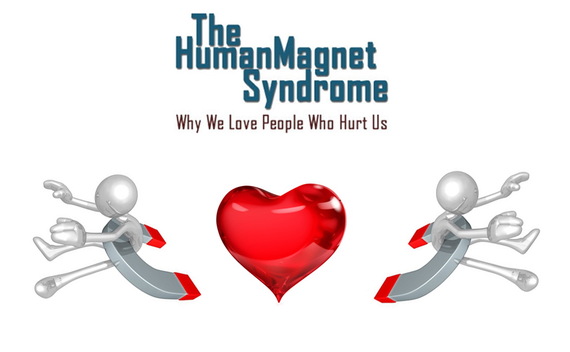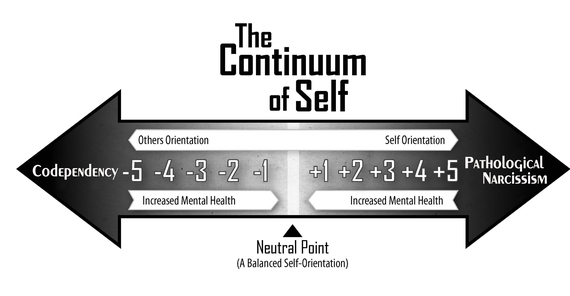Ross Rosenberg reveals the hidden truth behind relationship chemistry.
Have you been working on your online dating profile? Posing for the perfect selfie? Finding the exact right words to describe your wonderful self? Sadly, and unfortunately, all of the effort in choosing the best photographs, writing one's personal biography, and positioning oneself in the most appealing personality and lifestyle categories is all for naught; it simply doesn't matter.
Adding insult to injury, it is futile to base your hopes for a happy relationship on the careful reading and interpreting of a potential love interest's profile, while scanning every pixel of their pics with a magnifying glass looking for potential clues or red flags. Why? Because dating chemistry is not based on your prospective match's face or body type, musical interests, favorite foods, political leanings, education, religion, or other criteria. Dating chemistry is based on The Human Magnet Syndrome!
The Human Magnet Syndrome accounts for one of the most common couplings we see -- the pairing of caretaking, empathetic, and altruistic codependents with selfish, arrogant, controlling, and harmful narcissists.
What we call chemistry between two lovers is the unconscious matching of perfectly balanced opposite personality types. I describe this phenomenon in detail in my book, The Human Magnet Syndrome: Why We Love People Who Hurt Us. The Human Magnet Syndrome accounts for one of the most common couplings we see -- the pairing of caretaking, empathetic, and altruistic codependents with selfish, arrogant, controlling, and harmful narcissists, who simultaneously fall head over heels in in love while remaining tied together in a long-term dysfunctional relationship.
When a caretaking woman feels the chemistry bliss over her narcissistic romantic man (or vice versa), it is not because of any similarities she shares with him. Rather it is due to the activation of unconscious psychological attraction mechanisms that recognize a perfect "dancing partner" who makes her heart skip a beat or two. His boldness, charisma, self-confidence, and charm create the illusion that he is the man about whom she has always dreamt. Little does she know that she, a codependent, has chosen, yet again, another in a long list of narcissists.
Human Magnet Syndrome chemistry, of course, goes both ways. Mr. Perfect's unconscious chemistry machinery has also been activated. His heart is aflutter over this perfect angel of a woman who listens to him, cries for him, and validates all of the "unfair treatment" he has received from his ex-wives who demand child support, the IRS who is auditing him, and the long line of jobs from which he was terminated for "knowing the job better than (his) bosses." So of course, Mr. Perfect, a.k.a. the narcissist, has also hit the (dysfunctional) relationship jackpot. At the end of the day, the codependent's dreams of a soulmate invariably dissolve into a "cellmate" reality.
The multi-billion-dollar Internet dating industry doesn't realize it, but despite all those algorithms, all that matching, and all that swiping, they are selling the Human Magnet Syndrome. When two romantic hopefuls meet, whether by chance or the result of an Internet dating site's heralded selection technologies, they will instantly feel comfortable, familiar, and safe when their self-orientations match up. What, you ask, is a self-orientation? A self-orientation is defined as the manner in which a person distributes or takes love, respect, and caring (LRC) in relationship. Self-orientation is divided into two categories: those who are comfortable with giving away and not receiving LRC, and those who are more comfortable taking LRC while not reciprocating.
Like a dancing partnership, the caretaking and others-oriented person will naturally feel comfortable and instinctively familiar with a "dance partner" who is in need of caretaking and who focuses on his (or her) needs more than their own. The same intuitive feeling of familiarity and comfort is experienced by the other "dance partner." Like opposite sides of a magnet, these two "human magnets" are unconsciously drawn to each other because of the way their self-orientations match up, not because of the compatibility of their Internet dating profiles or the allure of their attractive photos. This magnetic love connection predictably and inevitably begins like a fairy-tale, but quickly morphs into a painful "seesaw" of love and hate and hope and disappointment. It's simple chemistry at work!
♦◊♦
The Human Magnet Syndrome Chemistry phenomenon is almost always this way. Just ask your friends, think about your own family, or analyze your own dating history. You will discover that chemistry, or that intuitive feeling of relational and romantic perfection, exists because of the connection of opposite self-orientations, not because of a well thought out list of similarities, likes, and dislikes.
Consider your own chance encounters and skillfully matched dating setups, which seemed perfect "on paper" but wouldn't elicit the smallest of romantic sparks or chemistry.
Consider your own chance encounters and skillfully matched dating setups, which seemed perfect "on paper" but wouldn't elicit the smallest of romantic sparks or chemistry. You will likely conclude that, when self-orientations are similar, shared feelings of disappointment and frustration are experienced, especially if there are areas of conscious compatibility. To illustrate, the smoldering sexy man with six-pack abs and the drop-dead gorgeous woman who sports a perfect set of lips and long beautiful legs just might not be a good match. If these seemingly well-matched romantic hopefuls have a similar self-orientation, then Mr. Smoldering will never connect with Ms. Gorgeous. Or, if entranced by lust, the lack of chemistry will surely be the bucket of cold water that tears these two apart.
The promise of the perfect match or soulmate sells more subscriptions than the uncomfortable truth: the bonding of similarly lonely and unhappy personality types..
It's my theory that the folks at the helm of the big Internet dating companies either don't know about the Human Magnet Syndrome, or shy away from negative and complicated "blame your parents" psychological explanations. I am sure the promise of the perfect match or soulmate sells more subscriptions than the uncomfortable truth: the bonding of similarly lonely and unhappy personality types--codependents and narcissists. It is difficult to imagine Match.com, eHarmony, or Tinder embracing the Human Magnet Syndrome explanation over their multi-million-dollar marketing and advertising campaigns that offer the promise of finding a soulmate through patented scientific matching algorithms.
Everything in my life, both personally and professionally as therapist, confirms the causal connection between The Human Magnet Syndrome and romantic chemistry. Moreover, my clinical work, personal dating, and relationship experiences along with the thousands of testaments from clients, readers, social network connections, and YouTube subscribers, all validate the codependent/narcissistic chemistry connection.
So here's the bottom line: the romantic relationship that is brought together by an interminably strong magnetic force will survive the test of time as it adheres to the human instinct to find and stay with a partner who is uniquely compatible and familiar.
According to The Continuum of Self Theory, compatible romantic partners tend to stay true to their uniquely opposite relationship orientation. The same applies to the human magnet syndrome: We are attracted to and maintain relationships with individuals whose "magnetic polarity" differs and, therefore, is compatible with our own.
Does all this mean you should stop swiping or inputting your interests on your dating profile? No. It means you should start thinking so you can understand the underlying basis of attraction as you try to find lasting harmony with a romantic partner.
Ross Rosenberg is a psychotherapist and trainer and the author of The Human Magnet Syndrome: Why We Love People Who Hurt Us. Ross owns Clinical Care Consultants, an Arlington Heights and Inverness IL counseling center and Advanced Clinical Trainers where his seminar / training work is available, and that of others. Ross is also a YouTube Creator, as his video channel has garnered (as of 10/16) over 4,250,000 views and 40,000 subscribers.



